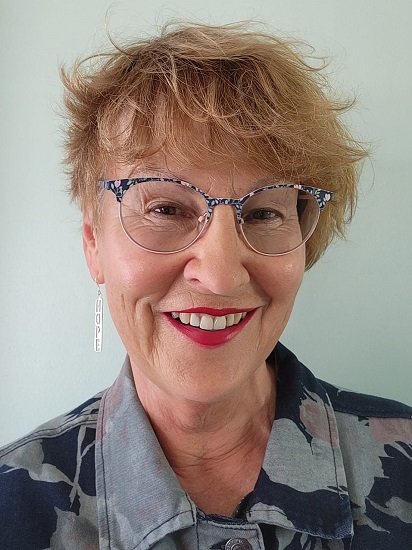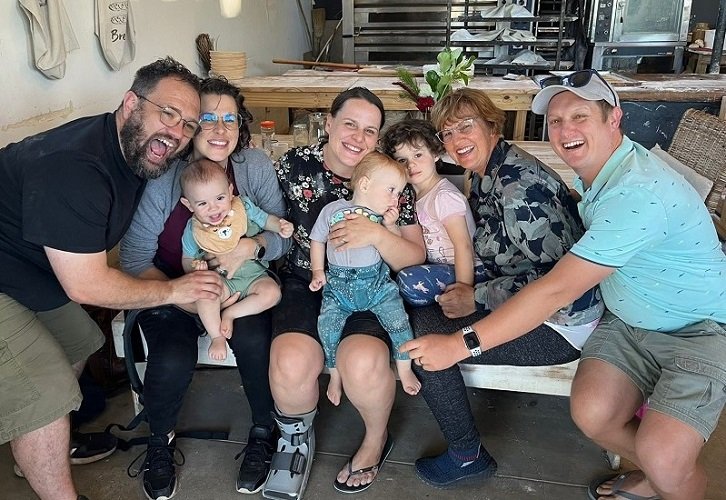Annette de la Porte on tadpoles, paradise, love and loss
A social worker and international Emotional Logic training consultant writes about being an adventurer at heart, travelling with live chickens and befriending our emotions.
1 What are your fondest childhood memories?
Standing knee deep in the water in the dam, catching tadpoles with an empty tin and releasing them again.
and …
Climbing the highest tree near our house on the farm, which had a comfortable branch to sit on and read.
2 What inspired you to become a social worker?
My parents treated everyone with respect, no matter the colour of their skin. I remember strangers arriving on our farm asking for directions to a place or a person. They would leave with directions and a bag of whatever crop my father was growing, which could be potatoes or a box of yellow peaches. My mother always had a community project going that would combine teaching a craft whilst rendering support and building friendships. When there was an illness or death in a family, she would make meals and deliver it with a hug.
3 Your business sense is well-developed – in which ways have you expressed it through the years?
My mother was a teacher who turned into an entrepreneur when she married a farmer. She constantly found ways to bring in an extra income, like drying yellow peaches or growing flowers. She was the first woman in our region who planted a field of chrysanthemums to deliver cut flowers to the florist in our nearest town. A childhood picture I have of my mother was of her sitting on a wooden crate under the shade of a tree, surrounded by a group of women employees. While they were working the peaches, they would tell stories and there was always laughter.
Image: Pexels
When I married a pastor, there was more month than a salary could cover. Over the years, I always worked as a social worker. I also did direct selling, was a network marketer, estate agent, fundraiser and eventually came full circle to doing social work full-time. Network marketing was big in the 1990’s and that is how I travelled to Botswana, Zambia, Kenya and Tanzania to expand my business. For a season, fundraising projects for our NGO became a full-time job. My gift with words was combined with public speaking and over the years I was always presenting seminars. The content varied from why you need to use vitamin supplements, invest in property, and need to learn to set healthy boundaries. Now I present webinars to help people to befriend their emotions.
Annette clarifies Emotional Logic, a tool to help us understand our emotions, enabling us to process our pain.
4 Years ago, you expanded your business to Botswana, Tanzania, Zambia and Kenya. Tell us a little about your adventures and what made you do this challenging work.
I am probably an adventurer at heart who had the guts to “boldly go where no man had gone before”. Compliments to my husband who allowed me to drive a Honda Ballade from Pretoria to Zambia and back – a 20 hour trip one way.
Tanzania required a plane ticket and from there I would travel to Kenya in a proper African bus, loaded with live chickens and corrugated iron plates for building houses. When you survive the stampede on an African bus stand, your skin grows ten inches thicker and you are instantly equipped to manage a panic attack.
I had one big accident on my driving journeys when a stray dog unexpectedly ran in front of the car. It cost me a new radiator and I missed out on presenting a business seminar in Lusaka. It was in 1993 before the days of cell phones and I did not have a way to communicate our misfortune. At the same time, I counted my blessings for finding an open garage that had the necessary spare parts.
People like that are God’s angels on the journey of life. My great sense of humour often came to my aid. I remember the evening when three of us were waiting for a taxi minibus in Dar es Salaam. A taxi stopped, already overloaded with human bodies of all shapes and sizes. I asked my local partner to translate and asked the driver if he suggested that we climbed up on the roof-rack to be seated? Everybody laughed heartily. There was also the moment when this mzungu (white woman) drove a little girl to hysterical tears, because she had probably never seen a white person before. To her, I must have looked like a ghost.
I combined my childhood experience of working alongside farm workers with the desire to give people an opportunity to generate an income. It married my entrepreneurial spirit, my love of people and my motto to “leave people better than I found them”. At the same time, I succeeded in providing an extra income for my family.
5 You have worked in two prisons and two psychiatric hospitals. What did this teach you?
My calling is from Isaiah 61, where it says: “Heal the broken-hearted and set the captives free”. I loved the multi-disciplinary team approach of the first psychiatric hospital I worked at. Our team consisted of a psychiatrist, nursing staff, psychologist, social worker, pastoral counsellor and an occupational therapist, and we fitted like a glove.
Image: Unsplash
Looking back with the perfect 20/20 vision that hindsight provides, the two psychiatric hospitals schooled me in understanding depression as a mental illness and how essential holistic care is. I developed a deep compassion for people who suffer the confusion of a mental illness and have to face the stigmas of society. I harbour a fierce anger against the societal injustice according to which it is okay to suffer from a physical illness but not okay “to have a sickness from the neck up”.
After hospitalisation, you never encounter a patient again. The longer “availability” of prisoners offered me the privilege of learning how to engage with people in a long-term healing and equipping process.
6 Your husband, André, suffered from depression for 35 years and finally committed suicide, as you explained in our podcast titled ‘How I have coped with my husband’s self-death.’ Does one ever overcome as deep a loss as this?
This was a question I recently wrestled with, when I had to empty the garage as part of the process of expanding my house. There were some boxes I had never unpacked because I lack storage space in my house. Triggers are always unexpected and opening some of those boxes caused a beautiful outpouring of tears. Tears cried in grief release toxins that get stored up in your body if you suppress your heartache and do not cry.
May I rephrase your question by saying that loss is not something that you overcome? When you are able to name the specific values that were violated by someone’s death, you can bargain some of them back into other supportive relationships. To me, grief is no longer a process with “phases.” It is also not something I fear. Grief is a testimony to how much I have loved. To mourn is a conscious decision. In learning how to partner with my emotions and hear the values they remind me of, I can go with the ebb and flow of high tide and low tide. I am bouncing back more quickly. I am turning my scars into stars.
Here Annette honours her beloved André and shares how she has been coping with his suicide.
7 Tell us about your nearest and dearest.
I am blessed with two daughters and two sons in law (I jokingly call them my sons in love). Danica and Githa are two amazing humans and André and I agreed that we’d raised two life-changers. They are both social workers, having grown up in a household that always talked about counselling and helping people.
Githa and Simon are blessed with a four year-old daughter, Lucy-Antoinette. Her baby brother Luca is now 17 months old.
Danica and Sean are raising the extrovert of the playschool and Lev is 16 months old. These two cousins differ only one month and love playing together. My children stay in 20-minute driving distance from each other in Pretoria and are an excellent mutual support team. I offer beach holidays in my paradise on the west coast of Cape Town.
8 What are your dreams for the future?
I’m already living my lifelong dream of having a house at the sea. There is nothing like a walk on the beach to improve your emotional steadiness.
For the past three years, I’ve dreamed of expanding my house so that I could have a Zoom-room with a view of the beautiful conservation area outside my house.
There was an issue with the building plans and the boundary lines. A prayer friend send me a scripture in Proverbs 15:25: “God will establish the boundary lines of the widow.”
And so He did! God also blessed me with a financial gift and building started on the 18th of April this year.
I dream of finding the right “umbrella,” like a short University course, that will bring educational accreditation to Emotional Logic which to me is the “holy grail” and simply the most effective, life-changing set of counselling tools.
Then, becoming more fit: After my dog Cinderella died on the 2nd of January this year, I made a courageous choice to join the local Pilates class in the town hall three mornings a week.
My biggest current dream is writing a book: “Hope Restored”. Nobody understands their emotions and if I can teach people to do so, it will be a bestseller 😊
Contact details
Annette de la Porte is a social worker, international Emotional Logic training consultant and CPD trainer, motivational speaker and author who lives on the Cape West Coast. She has a private practice and works in person and online.
Email Annette for her ‘Retreat Centre for Women on the West coast of South Africa’.
Email: annette@growwithannette.co.za
Tel: 083 794 3537
Website: https://growwithannette.co.za/ - contains resources including Annette’s Daily Disappointments Training linked to load shedding. Special introductory offer: R250
Luister na Annette se ervaring van saamleef met geliefdes met depressie en haar praktiese raad oor die handhawing van jou eie emosionele balans.
Images of Annette and her family: provided.
Thumbnail image: Unsplash.



